Liz Sherwood-Randall Is the Most Powerful Woman You’ve Never Seen — Until Now (Exclusive)
The homeland security adviser and mom of two works in the shadows of the White House Situation Room. Her work is classified, but her mission is not
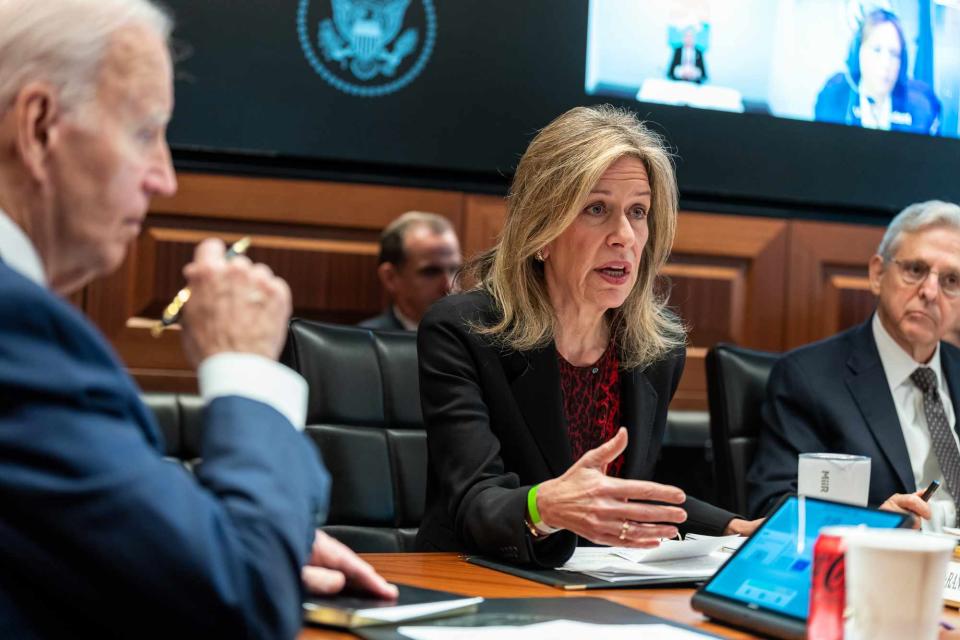
Official White House Photo by Adam Schultz
Liz Sherwood-Randall, flanked by Joe Biden and Merrick Garland in the Situation Room, discusses possible domestic terror threatsLiz Sherwood-Randall, the homeland security adviser since 2021, is a West Wing fixture broadly tasked with keeping Americans safe
From daily intelligence briefings to White House Situation Room meetings, most of her work is highly classified, and she is largely hidden from public view
In an exclusive sit-down interview with PEOPLE, the mother of two pulls the curtain back on the daily pressures of her high-stakes role
Prodded on some specifics of her daily routine, Liz Sherwood-Randall offers a simple, direct response: "I can't talk about that, actually."
At 64, the United States homeland security adviser knows exactly how much she can share without compromising public safety. She doesn't often get personal with reporters, but in an exclusive new interview with PEOPLE, she opens up about the unique job — and how it impacts her other key role: Mom.
During a previous PEOPLE White House visit in 2022, while explaining her team's counterterrorism efforts, Sherwood-Randall teased the intersection of her two worlds. Bringing her hands up to her heart, she said, "My son texted me after attending a baseball game recently just to say, 'Thanks for keeping me alive today.' " Now she's digging deeper.
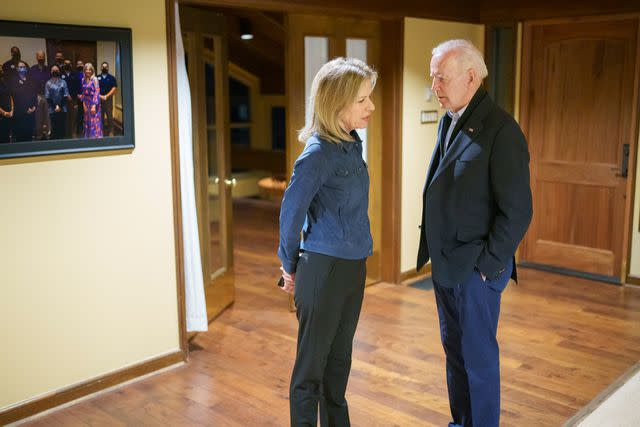
Official White House Photo by Adam Schultz
Liz Sherwood-Randall pulls President Joe Biden aside at Camp David on April 16, 2022, to brief him on the Columbiana Centre Mall shooting in South Carolina"She's got one of the toughest, most unforgiving jobs in the world"
Ben Sherwood, former ABC News president
The life of a homeland security adviser sounds like something from a political thriller. On an average day, Sherwood-Randall wakes before dawn, brainstorms solutions to the nation's ongoing problems while running on the treadmill, hops into a vehicle driven by an Army service member, and, on her way to the White House, receives an intelligence briefing about what happened in the world overnight.
When she arrives at her West Wing office — a windowless room where mobile devices are banned for security reasons — around 7 a.m., she prepares to meet with the president and advise on how they should tackle the issues they're facing.
From there, it's meetings upon meetings with a variety of experts from across the government, typically running on "one strong cup" of coffee and little to no bathroom breaks. A good day means she's out the door before 9 p.m. for a short night's sleep with her cellphone ringer on.
"I have to be like a fireman, always ready to slide down the pole," she tells PEOPLE. "There's never a day when I can kick back. I never know what's going to be required."
Through it all, Sherwood-Randall maintains her composure, bringing a sense of calm to the role that is felt as much in her interactions as her environment.
Her bunker of an office is softened with flower bouquets she curates from her personal garden and a large bowl of colorful Life Savers candies. (It's a metaphor, she explains, of the team's work.) She keeps a framed photo from the sole vacation she's taken in more than three years on the job: Christmas hiking in New Zealand with her family.
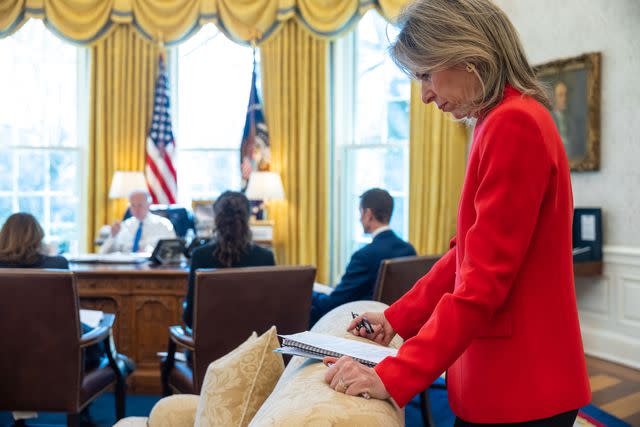
Official White House Photo by Adam Schultz
Liz Sherwood-Randall refers to her notes in the Oval Office as the president meets with advisers on Feb. 14, 2023"She somehow manages to combine being very tough with being very empathetic and human"
Jake Sullivan, national security adviser
The homeland security adviser role was born out of the 9/11 terrorist attacks, aiming to support the White House on counterterrorism efforts and liaise between the Oval Office and relevant federal departments.
Today, the adviser's portfolio has expanded to include responding to disasters, safeguarding critical U.S. infrastructure, bolstering security against emergent diseases and bio attacks, and disrupting the spread of fentanyl and other illicit drugs — generally speaking, anything that protects the American people from harm.
Related: How the Biden White House Is Supporting Texas amid Deadly Winter Weather
It's a broad and challenging job that requires forceful decision-making, yet Sherwood-Randall, who assumed the position in January 2021, doesn't come across like the ruthless type.
"Liz tracks terrorists and drug traffickers all over the world, but also chases down the best bakeries in every city she visits," says former ABC News President Ben Sherwood, her younger brother. "She’s unflinching and unyielding about protecting the homeland, but also sings along to her favorite country music songs."
Former White House press secretary Jen Psaki tells PEOPLE that while Sherwood-Randall is "clearly brilliant and tough and fierce," she is also "one of those rare people who took the time, even on the most stressful days in the White House, to check in and ask about my life and my kids."
"She somehow manages to combine being very tough with being very empathetic and human. And that's frankly what you need for the span of issues that she deals with in her job," adds national security adviser Jake Sullivan, who tells PEOPLE there are "very few people" better suited to handle such a challenging mix of responsibilities with life-or-death consequences for everyday Americans.
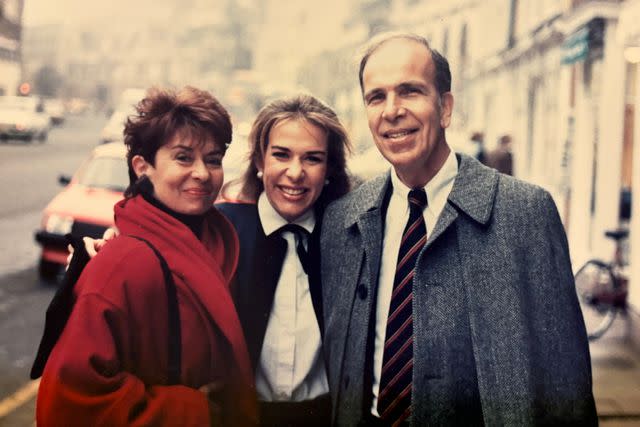
Courtesy of Liz Sherwood-Randall
Oxford University Rhodes Scholar Liz Sherwood-Randall with her parents, Dorothy and Richard Sherwood, in 1986 after receiving her doctoral degreeSherwood-Randall, a California native who speaks French, Spanish and a little Russian, is a Harvard alum turned Rhodes Scholar who caught the attention of Washington at 26 years old as she completed her doctorate in international relations in 1986.
Delaware's junior senator at the time, Joe Biden, plucked the newly minted Oxford graduate to become his principal adviser on foreign affairs and defense policy, offering her a chance to distinguish herself as a promising young woman in a male-dominated field.
Related: Joe Biden Will Nominate Janet Yellen to Be First Female Treasury Secretary
Within a few years, she co-founded the Strengthening Democratic Institutions Project at Harvard Kennedy School and, by 1994, she was a deputy assistant defense secretary specializing in Russia, Ukraine and Eurasia. She garnered awards for leading the Clinton administration's efforts to denuclearize three Soviet states, including the Pentagon's Medal for Distinguished Public Service.
"The thing that I learned in those [Pentagon] years — I was 34 when I started that job — was the hotter it gets, the cooler you have to get," she tells PEOPLE. "You have to be so steady. ... And if you're not able to do that, you really can't perform at the level that's expected."
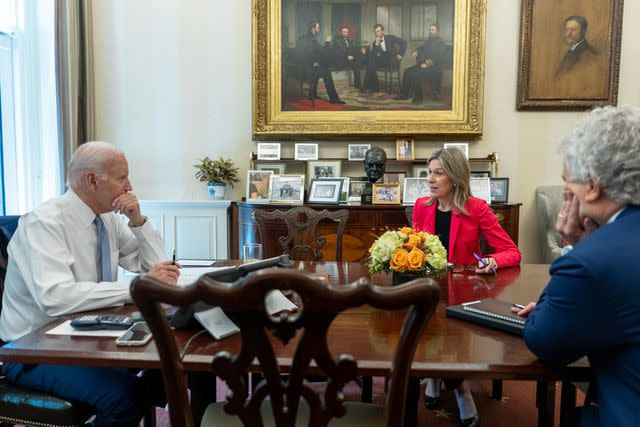
Official White House Photo by Adam Schultz
Liz Sherwood-Randall is called into the Oval Office Dining Room to meet with the president and his chief of staff on July 27, 2023, about a military coup unfolding in NigerShe went on to serve in a number of academic and advisory roles at universities, the Council on Foreign Relations and the Brookings Institution. She was the National Security Council's senior director for European affairs under President Barack Obama before he installed her as the deputy energy secretary and tasked her with fortifying the power grid against emerging threats.
"In the years that I served at the Department of Defense, the secretary of defense who I served ... said to me, 'Liz, the hardest problems are the problems that are most worth working on,' " she recalls. "And I've taken that as guidance for my life."
So when Biden won the presidency in 2020 and asked Sherwood-Randall how she wanted to apply her experience in the administration, she replied, "I want to work on really hard problems."
She didn't realize quite how difficult the evolving issues would become when she was named the homeland security adviser — but even if it has meant putting her personal life completely on hold, "it feels to me like it's the right use of this life."
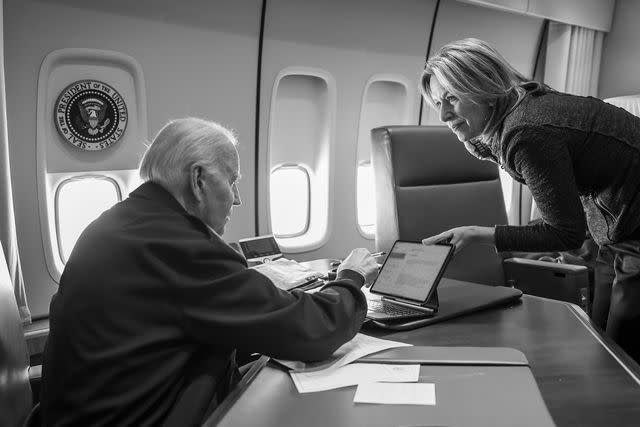
Official White House Photo by Adam Schultz
President Joe Biden confers with Liz Sherwood-Randall aboard Air Force One on Feb. 3, 2024"There are no red states or blue states when Americans are in need"
Liz Sherwood-Randall
On any given day, Sherwood-Randall's schedule can be completely upended in the event of a new threat or mass casualty incident. Amid active shooters, international unrest, unforeseen tragedies and natural disasters, she knows the exact combination of people to call on to quickly neutralize the situation — and then she works with local governments to rebuild.
"She is very good at simulating collaboration," Sullivan says. "She finds people who know the subject matter, know how to solve problems, know how to generate courses of action that will get results, and then she brings them together and she empowers them."
Her résumé — including decades of working alongside military leaders — certainly helps with her preparedness, Sullivan adds. "She can draw from all of those very different experiences to generate this kind of crazy capacity to deal with whatever's thrown at her, and do it with a team of people who she understands and respects and lifts up, because she's dealt with them before."
Related: Joe Biden Pledges Federal Assistance After Surfside Condo Collapse: 'Unimaginably Difficult Time'
When Baltimore's Francis Scott Key Bridge collapsed in March, for example, Sherwood-Randall was awoken by the Situation Room command center and tasked with quickly assessing whether there was an ongoing danger to locals.
"The first question is always, 'Was this an accident or was it a terrorist attack?' " she says. "And that's basically a fork in the road, because if it's an accident, then it involves a set of response actions. If it's a terrorist attack, then there's a whole additional dimension: 'Is there more coming? How do we secure the homeland? What do we need to do potentially to respond to it?' "
In that case, Sherwood-Randall knew within an hour that the bridge collapse was an accident, not a coordinated attack. Then came the discussion about getting Baltimore back on its feet.
"We're working very hard on a series of initiatives to strengthen our ability to help communities that are impacted by disasters to rebuild more successfully," she says of one of her broader goals in the Biden administration. "We have found in our work that, not surprisingly, those who are the least prepared for a disaster have the hardest time recovering and rebuilding. And so we're really focusing on how we can get out there and stay the course with those communities to help them to rebuild."
Related: Rebuilding Baltimore Bridge Could Take Years, Experts Say: 'Will Not Be Quick or Easy or Cheap'
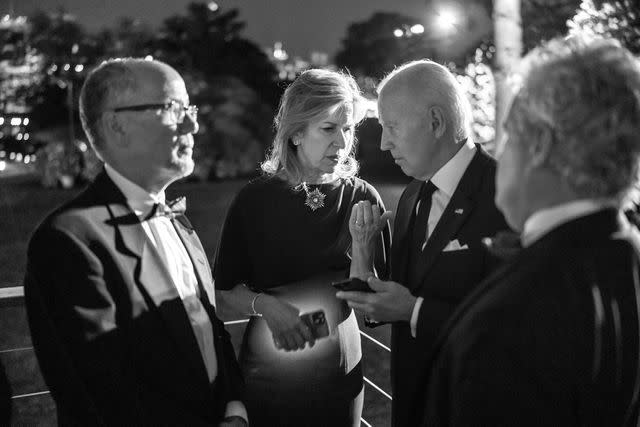
Official White House Photo by Adam Schultz
Liz Sherwood-Randall interrupts President Biden at a White House state dinner on Oct. 25, 2023, to share that a mass shooting was unfolding in Lewiston, Maine"There are so many threats to living your life and dreaming your dreams that should not exist"
Liz Sherwood-Randall
In the event of a domestic tragedy, Sherwood-Randall is often first to hear the news. Then it's her job to brief the president.
She thinks back to the mass shooting in Lewiston, Maine, in October, in which 18 people were killed and another 13 wounded. She was attending a White House state dinner when the scene unfolded, and colleagues told her that as she stood up with her phone in hand and beelined to the president's table to interrupt him, it was clear something bad had happened.
Related: A Bar Manager, Best Friends and Sister: Remembering the Victims of the Maine Mass Shootings
"So many of our young people are impacted by gun violence. So early in their lives, schools have to train for active shooters and all these things that should never be a part of a young person's experience," she says. "You can't go to a bar without actually thinking, 'What's going on here? Is this going to be a safe place for me to be?' "
As the mother of two Gen Z sons — Richard, 26, and William, 24 — she hopes to make some sort of difference.
"I think about that a lot," she continues, "about how we can do more to create safety in our communities through the levers that we have here at the White House and throughout the administration ... because I want my kids and everyone like them, of course, to be safe."
With task forces on fighting hate crimes, regular planning meetings on curbing fentanyl and confabs with federal departments, members of Congress, governors and local mayors, she hopes to get to the root of the problems.
"In the beginning of an administration, there's an opportunity to shape policy," she says. "When you get to the fourth year of a first term, you're very intensively focused on implementation."
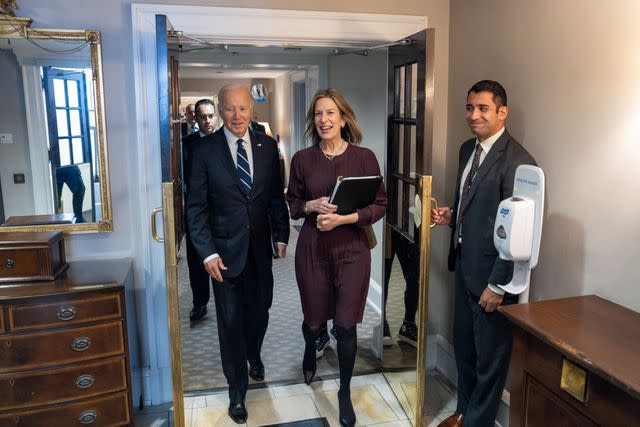
Official White House Photo by Adam Schultz
President Joe Biden and Liz Sherwood-Randall walk through the West Wing on their way to the 2023 Summit on Fire Prevention and Control"Family and friends sleep better at night knowing that Liz is keeping watch"
Ben Sherwood, former ABC News president
Her neurosurgeon husband, Jeffrey, and their sons stayed in California when Sherwood-Randall returned to Washington for her latest role — and she says they've felt gratitude for the unseen work she does in the Situation Room each day. It's why, a couple of years back, William thanked her for simply returning home from that baseball stadium safely.
"They have understood that the sacrifice that comes with doing this kind of work is about something that is larger than us. It's about trying to really create the space in this country for people to live their lives and dream their dreams, go to a ball game and not be afraid," she says.
"In my childhood, my mom and dad really set the example for us of valuing public service, respecting public servants and using our lives for public purpose. That was in my DNA," she continues. "And I think that our kids have also absorbed that set of values and in their own ways are choosing how they can embody them."
Richard is finishing a Ph.D. at Stanford to become a climate scientist, focusing on how to "save the world" by capturing methane from the atmosphere and slowing global warming. William is gearing up to start medical school.
"They're the lights in my life, and they are choosing paths of service to others to try to make a difference in the world, which is really what we hoped they would do through the life that we have led," she says.
Never miss a story — sign up for PEOPLE's free daily newsletter to stay up-to-date on the best of what PEOPLE has to offer.
Presidential administrations come and go, and Sherwood-Randall doesn't know what her future holds. But thinking of all the people she has encountered who are willing to run toward danger instead of flee — and seeing how younger generations are contributing — she feels optimistic that the homeland will always have its defenders.
"We have so many amazing people who give their lives to service," she says, "and we need to remember that we're all in it together."
For more People news, make sure to sign up for our newsletter!
Read the original article on People.


